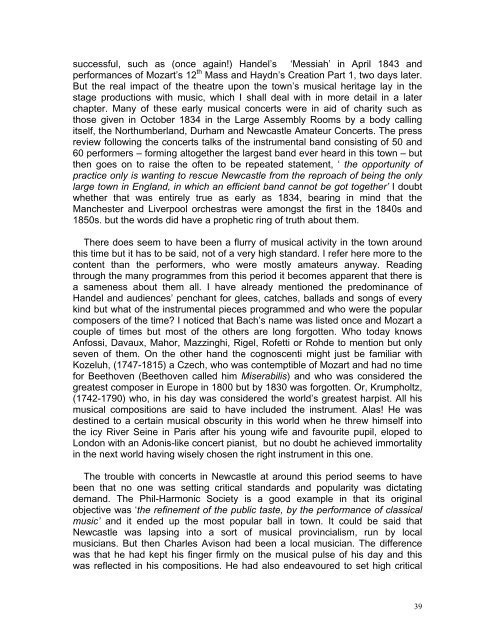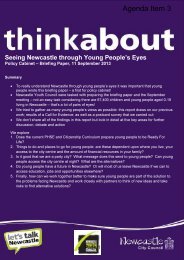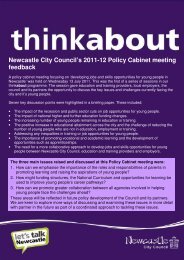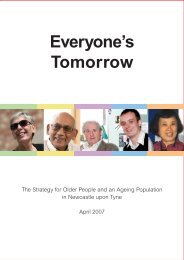NEWCASTLE'S MUSICAL HERITAGE AN INTRODUCTION By ...
NEWCASTLE'S MUSICAL HERITAGE AN INTRODUCTION By ...
NEWCASTLE'S MUSICAL HERITAGE AN INTRODUCTION By ...
Create successful ePaper yourself
Turn your PDF publications into a flip-book with our unique Google optimized e-Paper software.
successful, such as (once again!) Handel’s ‘Messiah’ in April 1843 and<br />
performances of Mozart’s 12 th Mass and Haydn’s Creation Part 1, two days later.<br />
But the real impact of the theatre upon the town’s musical heritage lay in the<br />
stage productions with music, which I shall deal with in more detail in a later<br />
chapter. Many of these early musical concerts were in aid of charity such as<br />
those given in October 1834 in the Large Assembly Rooms by a body calling<br />
itself, the Northumberland, Durham and Newcastle Amateur Concerts. The press<br />
review following the concerts talks of the instrumental band consisting of 50 and<br />
60 performers – forming altogether the largest band ever heard in this town – but<br />
then goes on to raise the often to be repeated statement, ‘ the opportunity of<br />
practice only is wanting to rescue Newcastle from the reproach of being the only<br />
large town in England, in which an efficient band cannot be got together’ I doubt<br />
whether that was entirely true as early as 1834, bearing in mind that the<br />
Manchester and Liverpool orchestras were amongst the first in the 1840s and<br />
1850s. but the words did have a prophetic ring of truth about them.<br />
There does seem to have been a flurry of musical activity in the town around<br />
this time but it has to be said, not of a very high standard. I refer here more to the<br />
content than the performers, who were mostly amateurs anyway. Reading<br />
through the many programmes from this period it becomes apparent that there is<br />
a sameness about them all. I have already mentioned the predominance of<br />
Handel and audiences’ penchant for glees, catches, ballads and songs of every<br />
kind but what of the instrumental pieces programmed and who were the popular<br />
composers of the time I noticed that Bach’s name was listed once and Mozart a<br />
couple of times but most of the others are long forgotten. Who today knows<br />
Anfossi, Davaux, Mahor, Mazzinghi, Rigel, Rofetti or Rohde to mention but only<br />
seven of them. On the other hand the cognoscenti might just be familiar with<br />
Kozeluh, (1747-1815) a Czech, who was contemptible of Mozart and had no time<br />
for Beethoven (Beethoven called him Miserabilis) and who was considered the<br />
greatest composer in Europe in 1800 but by 1830 was forgotten. Or, Krumpholtz,<br />
(1742-1790) who, in his day was considered the world’s greatest harpist. All his<br />
musical compositions are said to have included the instrument. Alas! He was<br />
destined to a certain musical obscurity in this world when he threw himself into<br />
the icy River Seine in Paris after his young wife and favourite pupil, eloped to<br />
London with an Adonis-like concert pianist, but no doubt he achieved immortality<br />
in the next world having wisely chosen the right instrument in this one.<br />
The trouble with concerts in Newcastle at around this period seems to have<br />
been that no one was setting critical standards and popularity was dictating<br />
demand. The Phil-Harmonic Society is a good example in that its original<br />
objective was ‘the refinement of the public taste, by the performance of classical<br />
music’ and it ended up the most popular ball in town. It could be said that<br />
Newcastle was lapsing into a sort of musical provincialism, run by local<br />
musicians. But then Charles Avison had been a local musician. The difference<br />
was that he had kept his finger firmly on the musical pulse of his day and this<br />
was reflected in his compositions. He had also endeavoured to set high critical<br />
39

















